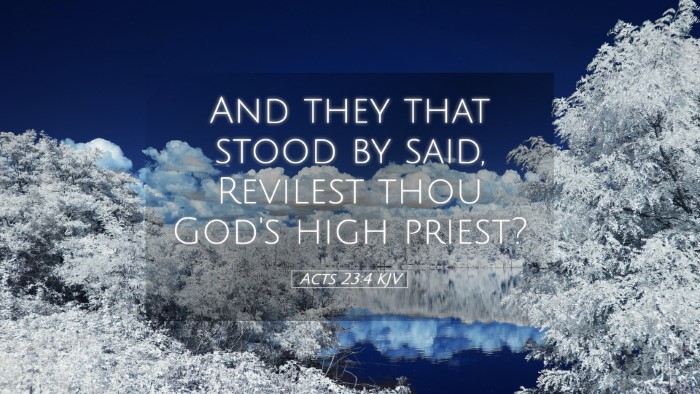Commentary on Acts 23:4
Verse Text: "And they that stood by said, Revilest thou God's high priest?" (Acts 23:4, KJV)
Introduction
This verse is pivotal as it portrays a moment of direct conflict in the early church, highlighting Paul’s encounter with authority and his response to it. Understanding this interaction requires a deeper examination of commission, authority, and the awareness of the law as exhibited by Paul. The insights from respected public domain commentators Matthew Henry, Albert Barnes, and Adam Clarke elucidate this verse meaningfully.
Contextual Analysis
To grasp the full significance of Acts 23:4, it is crucial to consider its context within the broader narrative of Paul's defense before the Jewish council. This episode follows a tumultuous series of events that led to Paul’s arrest in Jerusalem, where he was taken into custody due to accusations of inciting a riot among the people.
Matthew Henry’s Perspective
Matthew Henry elaborates on this moment as a confrontation between divine authority and earthly power. He states that the high priest’s position is ordained by God, and thus Paul’s response must be governed by respect for that office. Henry emphasizes that the disdainful response to authority reveals a tension between personal conviction and social order. Paul’s inadvertent insult to the high priest indicates his passionate dedication to truth, yet it also imparts a critical lesson on the importance of order in God’s house.
Albert Barnes’ Insights
Albert Barnes takes a closer stance on the implications of Paul’s words and the reactions of those present. He highlights that the question posed reflects a deep-seated Jewish sensitivity to the law, particularly regarding the treatment of religious leaders. Barnes notes that Paul’s original intention was to articulate his defense without malice. Yet, this interaction sheds light on the challenges faced by early Christians in negotiating faith and the governing authority they resided under. Barnes advocates for an understanding of respect that does not negate the commitment to truth.
Adam Clarke’s Commentary
Adam Clarke offers an analytical view of Paul’s demeanor in this tense situation. Clarke states that Paul’s reply, although immediate, was prompted by both confusion and a desire to assert his own standing in the face of injustice. He posits that there was a contextual misunderstanding that led to the accusation against Paul. Clarke brings forth the idea that the role of the high priest during this historical period was marred by political intrigue rather than pure spiritual authority, thus complicating the respect due to the office. Clarke emphasizes that the real message lies in Paul’s courage to stand firm on his principles while navigating the complexities of leadership and governance.
Theological Implications
The theological implications of Acts 23:4 are profound. Each commentator reveals layers of meaning that resonate well within pastoral and academic frameworks:
- The Nature of Authority: The interplay between divine and earthly authority is crucial. Each commentator underlines the necessity to balance respect for ordained authority while maintaining faithfulness to God’s commands.
- Conscience and Conviction: Paul’s reaction signifies a struggle that many face when moral clarity comes into conflict with institutional authority. It challenges believers to consider where their ultimate allegiance lies.
- Grace in Dialogue: The dialogue illustrates the grace needed when confronted with authority. One is encouraged to act with respect even when feeling wronged or misjudged, reinforcing the call to maintain civility in discourse.
Application for Pastors and Theologians
This verse resonates with the ongoing church dialogue regarding authority, respect, and confrontation. Pastors and scholars can glean the following applications:
- Emphasizing Respect: When addressing any disputes within the church or community, the need for respectful engagement with those in authority must be emphasized.
- Encouraging Honesty: The need for honest dialogue within church authority structures promotes health and unity, mirroring Paul’s ultimate goal of vindicating his message without undermining his respect for the office.
- Moral Courage: Encouraging believers to uphold their convictions while engaging with authority equips them to handle similar situations in their own contexts.
Conclusion
Acts 23:4 serves as a crucial narrative in understanding the complexities of authority, both human and divine. By reflecting on the commentaries of Henry, Barnes, and Clarke, modern readers are invited to consider how this tension applies in their ministry and personal lives. The insights offered provide not only historical and theological depth but also practical guidance for addressing authority in today’s church. In an age where conflict seems prevalent, the counsel drawn from this incident leaves an indelible mark on how one might approach leadership, respect, and the pursuit of truth.


